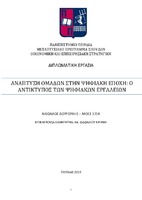| dc.description.abstract | Για να ανταποκριθούν αποτελεσματικά στην σημερινή πραγματικότητα της παγκοσμιοποίησης, οι επιχειρήσεις έπρεπε να δημιουργήσουν νέες δομές ώστε να ξεπεράσουν τα εμπόδια του πολιτισμού, του χώρου και του χρόνου: Οι εικονικές ομάδες χρειάζονταν πλέον νέες μεθόδους για να συνεργαστούν. Αρχικά, πολλές εταιρείες θεώρησαν τα Πληροφοριακά Συστήματα (IS) είναι απειλή ή πολύ απλά μια μέθοδος ώστε να μην υστερήσουν έναντι στον ανταγωνισμό. Υιοθέτησαν αυτά τα ψηφιακά εργαλεία για τη διευκόλυνση της λειτουγίας τους την ανταλλαγή δεδομένων και την αποθήκευση συμφωνα με το μέγεθος της επιχείρησης.Οι εργαζόμενοι ωστόσο δεν ήταν πλέον προτεραιότητα. Επρόκειτο για στρατηγικές λύσεις που συχνά καθυστερούσαν τις διαδικασίες σε λειτουργικό επίπεδο. Αυτά τα εργαλεία έχουν εξελιχθεί αρκετά για να διευκολύνουν πλέον τη συνεργασία μεταξύ των εργαζομένων.
Κι αν υποτιμήσαμε όμως τη δύναμη των ψηφιακών εργαλείων; Τι θα συνέβαινε αν μπορούσαν πραγματικά να επιδράσουν στην αποτελεσματικότητα στελέχωσης μιας ομάδας και να αποτελέσουν μοχλό παρακίνησης για το HR για την ενίσχυση της ευεξίας στο εργασίακο περιβάλλον και, συνεπώς, της συνολικής απόδοσης;
Η βιβλιογραφία που επικεντρώνεται στα ποιοτικά δεδομένα (με έμφαση στην απόδοση και το management) καθώς και η περίπτωσεις που αφορούν απομακρυσμένες ομάδες,μας ώθησαν στο να ενσωματώσουμε τις γνώσεις τόσο των μελών όσο και της διοίκησης των ομάδων ώστε να κατανοήσουμε αν η χρήση τέτοιων εργαλείων συσχετίζεται με την αποτελεσματικότητα της οικοδόμησης της ομάδας. Αποφασίσαμε να επεκτείνουμε τα αποτελέσματα σε ομάδες που δεν ήταν εντελώς εικονικές, δεδομένου ότι βασίζονται περιστασιακά σε εικονική επικοινωνία και εικονικά εργαλεία για να συνεργαστούν, ακόμη και αν έχουν τη δυνατότητα να εργαστούν σε ένα μόνο χώρο.
Επιλέξαμε να διεξάγουμε την έρευνα χρησιμοποιώντας μεικτές μεθόδους: (1) δύο ηλεκτρονικά ερωτηματολόγια (με αντιπροσωπευτικό δείγμα), όπου το πρώτο έπρεπε να συμπληρωθεί από τον manager και το δεύτερο από τα μέλη της ομάδας για να μπορέσουν να καταχωρηθούν τα αποτελέσματα. Με τη μέθοδο αυτή επιδιώξαμε να κατανοήσουμε ποια ήταν τα στοιχεία που ενίσχυσαν την επίδραση των εργαλείων ψηφιακής συνεργασίας. Καθώς και (2) συνεντεύξεις εμπειρογνωμόνων (με σχετικό δείγμα).
Πρωτίστως, αυτή η έρευνα προσπαθεί να θέση υπό εξέταση όχι μόνο την σχέση μεταξύ του HR και της στρατηγικής όπως δίδεται στη βιβλιογραφία, αλλά την αλληλένδετη φύση μεταξύ HR, IS και στρατηγικής. Ως εκ τούτου, τα ψηφιακά εργαλεία είναι μείζωνος σημασίας για την επίλυση της σύγκρουσης μεταξύ στρατηγικών και λειτουργικών δομών στο σύγχρονο εργασιακό περιβάλλον.
Τα αποτελέσματα έδειξαν ότι τα εργαλεία αυτά θα μπορούσαν να παρακινήσουν τον ανθρώπινο παράγοντα εάν χρησιμοποιήθούν αποτελεσματικά(δηλ. Σε ένα πλαίσιο που εξετάζει τους παράγοντες κρίσιμης επιτυχίας.) Αυτές οι συνθήκες φαίνεται να βρίσκουν πρόσφορο έδαγος σε μια εταιρική κουλτούρα που προάγει την καινοτομία και την ευημερία των εργαζομένων,ενώ καθιστά απαραίτητο να γίνουν τεράστιες αλλαγές στην ατομική οργάνωση (και συνεπώς κατάρτιση) καθώς και μεγάλες επενδύσεις στα πληροφοριακά συστήματα. | el |
| dc.description.abstractEN | Gone are the days when the workplace was merely a physical space, employees occupied during regular office hours. Today's always connected, instant access environment has blurred the lines between the physical office and the place where work actually happens. As the distinction between professional and personal life dissolves, and the workplace becomes truly digital, employees are communicating and collaborating in unprecedented ways. To enable knowledge sharing across the organization, they want the ability to forge productive business relationships beyond natural work groups. As a result, it is increasingly clear that the traditional 'create and push' information approach no longer meets employees’ evolving needs. To accurately reflect their staff’s changing work experience, leading organizations have begun to implement an entirely new working environment – the digital workplace. By integrating the technologies that employees use (from e-mail, instant messaging and enterprise social media tools to HR applications and virtual meeting tools), the digital workplace breaks down communication barriers, positioning you to transform the employee experience by fostering efficiency, innovation and growth. The key to success, however, lies in the effective implementation of a digital workplace strategy capable of driving true cultural change.
You’ve seen the impact high-performing teams can have in business. But what if they could achieve even more? What if they had the space to be more creative, to share ideas instantly and easily across geographies and generations while staying in sync with each other?
In a world where collaboration is how work gets done, teams need work spaces and tools they’re comfortable using. And it’s up to business leaders to make it easy for them to get both. The very nature of teams is evolving rapidly. There’s never been a wider spectrum of workstyles, there are more working millennials than ever before, remote working is commonplace, and the tools used to get work done have expanded far beyond email and phones. Teams are composed of people inside and outside traditional IT barriers, such as firewalls. They’re spread across time zones and composed of a changing cast of characters.
As a business leader, you need to make sure your organization provides collaboration tools that suit different personalities, skill sets and needs. Because what works for one person or
team may not work for another. You also need to accommodate the diverse workstyles of the multiple generations now in the workforce. Millennials have been using chat and social media their whole lives and want the same engaging, real-time experiences at work. Other generations favour the traditional voice, email and document-based apps. All tools need to interoperate seamlessly because everyone expects the fluid digital experiences they’re used to from their day-to-day lives as consumers.
But extending modern collaboration to meet these many requirements only succeeds if your platform can successfully unify people into high-performing teams, regardless of their needs and preferences. So, what is the right technology solution for modern collaboration and teamwork? It must be flexible enough to meet all your teams’ communication needs, become a single hub for teamwork, be customizable and stay secure. Such a hub is possible. With scalability, app integration capabilities, ease of use, and automation at the forefront of the tools you use, you can create higher-performing teams that collaborate more effectively with their colleagues every day. | el |


